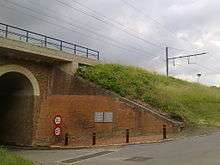Pécrot rail crash

The Pécrot rail crash was a rail accident in the village of Pécrot (part of the municipality of Grez-Doiceau), Belgium, that occurred on 27 March 2001 when two passenger trains collided head-on.[1][2] The crash left 8 dead and 12 injured and was Belgium's worst rail disaster in a quarter of a century.[1]
Timeline of events
- 08:41 — In Wavre station, a signalman noticed an empty passenger train departing from Track No. 4 against a red signal, towards Leuven.
- 08:42 — The Wavre signalman contacted the Leuven signalman, to inform him about the train. However, the Wavre signalman spoke only French while the Leuven signalman spoke only Dutch, so the latter did not understand the message fully.
- 08:43 — The Wavre signalman tried to have the overhead wire current cut off on the erroneously departed train's track. Whenever the power on the overhead wire is cut, the train driver is required by operational rules to reduce speed to a low speed and continue cautiously as long as the train is running. However, that could not be done from Wavre. The signalman therefore contacted a controller in Brussels about the problem.
- 08:46 — The Brussels controller tried to contact the driver of the train, but was unable to reach him. The Brussels controller also tried to contact the driver of a passenger train that had just departed from Leuven towards Wavre, traveling on the same track as the other train, in the opposite direction. Again, the controller failed to reach the driver.
- 08:47 — The overhead wire current was cut off, to require all drivers to reduce their speed to a low speed as by operational rules, but unfortunately too late.
- 08:50 — The two trains collided head-on in the village of Pécrot. 8 people were killed, including both drivers, and 12 were injured.[1]
Causes
The accident had two main causes. The first was the inexperience of the driver of the train which departed from Wavre.[1] The train had stopped with the driver's cab past the signal, so the driver could not see that the signal was red when he departed. The other cause was the language barrier between the station staff at Wavre and Leuven.[1] Both French and Dutch are official languages in Belgium, and rail staff were only required to speak one. NMBS/SNCB, the Belgian national railway company, admitted that the accident was caused solely by human error. Judge Philippe Ridelle presided the trial and pronounced the sentence.
See also
- List of railway stations in Belgium
- List of rail accidents (2000–2009)
- Seaspeak - a simplified common language
- PoliceSpeak - a simplified common language for the Channel railway Tunnel - uses English and French words.
- British absolute block signalling - a common bell code "language" for signallers
- Train running away on right line - passed signal at stop (SPAD)
- Train running away on wrong line - strictly speaking, applies only on double lines.
References
- 1 2 3 4 5 Lungescu, Oana. Crash Railmen Spoke Different Languages, BBC World News -Europe website, 30 March 2001. Retrieved 4 November 2010.
- ↑ BBC World News. Belgian Crash 'Was Avoidable', BBC World News -Europe website, 28 March 2001. . Retrieved 4 November 2010.
External links
Coordinates: 50°47′00″N 04°39′00″E / 50.78333°N 4.65000°E
| ||||||||||